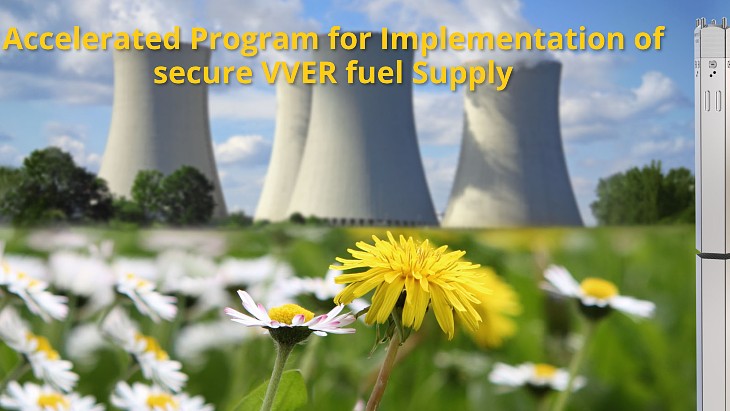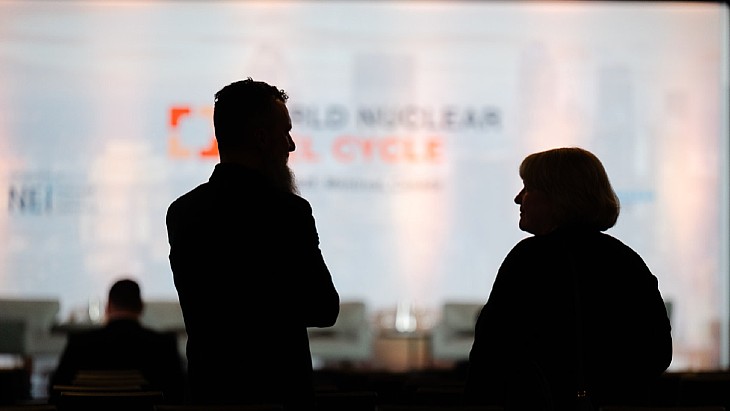European consortium focuses on VVER fuel

The Accelerated Program for Implementation of Secure VVER Fuel Supply (APIS) is co-funded by the European Union, with EUR10 million (USD10.9 million) from its Euratom programme. It started in January and has a three-year expected duration.
The APIS project has 12 partners from eight countries, including five nuclear power plant operators: ČEZ from the Czech Republic; Energoatom from Ukraine; Fortum from Finland; Paks NPP from Hungary and Slovenske Elektrarne from Slovakia. There are also five fuel engineering and research organisations: Joint Research Centre-European Commission in Belgium; Ukraine's State Scientific and Technical Centre for Nuclear and Radiation Safety; ÚJV Řež from the Czech Republic; Uppsala University of Sweden and VUJE of Slovakia.
The final two participants are fuel manufacturers Westinghouse Sweden and Enusa, from Spain.
Tarik Choho, Westinghouse Nuclear Fuel President, said: "The APIS project is a strong collaboration between suppliers and utilities, fostered by the EU, to mitigate the current supply chain risk and reduce dependence on VVER fuel supply from Russia."
He noted that some countries were already diversifying their fuel supplies and said Westinghouse’s fuel technology "is the only available technology fully independent from Russian technology" and added: "Westinghouse is deeply committed to offer, together with its partners, improved fuel designs and services with an even wider scope."
There are currently more than 30 VVER-440 or VVER-1000 reactors operating in the EU and in Ukraine, which was already switching away from Russian fuel before the war, and has since moved completely away.
The APIS project plan includes goals to:
- Develop safe fuel designs for VVER-440 plants for delivery in 2023, including upgrading or newly designed test equipment and test loops.
- Develop improved VVER-440 fuel designs, with improved fuel economics for operation and suitability for all EU and Ukraine plants, for delivery in 2024.
- Next generation VVER fuel designs - develop a VVER-1000 fuel design "with reduced pressure drop, improved thermal margins and improved strength targeting Lead Test Assemblies deliveries in 2025 and onwards. Evaluate design improvements in terms of ADOPT pellets and oxide coating for introduction earliest 2025. Initiate the development of the next generation VVER-440 fuel designs to further improve fuel economics, targeting deliveries from 2027 and onwards".
- Harmonised approach for VVER fuel licensing - "the objective is to identify a general approach to fast licensing and deploy alternative fuel for VVER reactors in the EU and Ukraine that satisfy international safety standards" such as the IAEA's. "The analyses performed for fuel and core operability will be defined as a general approach for all countries according to high safety standards accepted internationally. Acceptance for this approach will be ensured by workshops with regulatory organisations in Finland, Czech Republic, Hungary, Slovakia and Ukraine and the utilities."
Another aspect of the project's plan is to "develop manufacturing and/or supply chain re-instatement for VVER-440 fuel". There will also be investigation of the fuel design impact on the lifetime of a nuclear power plant and investigation of "different shielding concepts to protect the reactor vessel and reactor internals".
It notes a need for new inspections equipment to allow inspections of "modern Western VVER-440 fuel" and applying the inspection results for "optimising fuel performance codes and supporting future fuel deliveries to VVER-440 plants in Ukraine and the rest of Europe".
Earlier this year Westinghouse signed a 10-year contract to fabricate and deliver VVER-1000 nuclear fuel to Kozloduy unit 5 in Bulgaria. It already has supplied VVER fuel to Ukraine for more than a decade and in March signed an agreement to supply VVER-440 fuel assemblies from next year for the Dukovany nuclear power plant in the Czech Republic.
In September last year Westinghouse and Enusa announced their intent to collaborate on VVER-440 fuel fabrication. Westinghouse and Enusa have partnered since 1974 under a pressurised-water reactor fuel technology transfer agreement in support of nuclear plants in countries including Spain, Belgium, and France. Through their partnership, nearly 750 VVER-440 fuel assemblies were delivered to the Loviisa plant in Finland between 2002 and 2007. In January, as the two companies' cooperation was formalised, Enusa said it planned for a production line for the new fuel at its Juzbado factory to be finished and licensed this year, allowing fuel deliveries early in 2024.
_49098.jpg)
_57190.jpg)
_70526.jpg)
_75453.jpg)






_50521.jpg)

